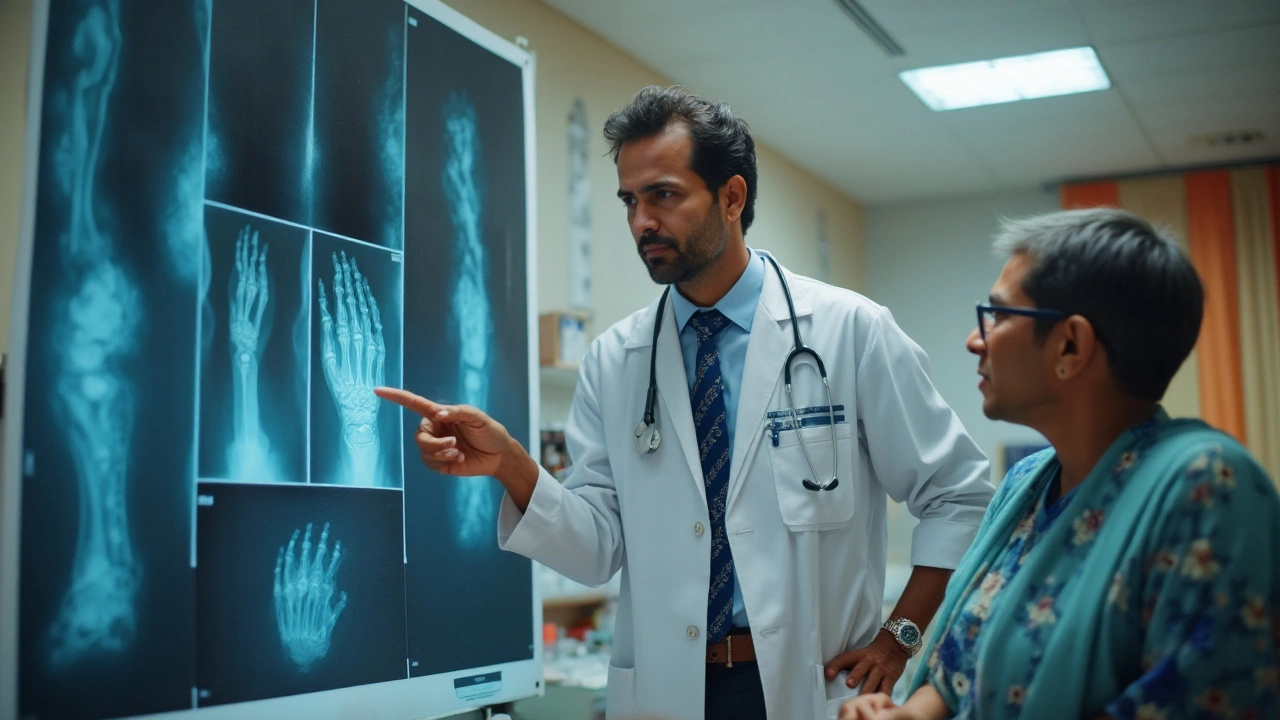Category: Orthopedic Health - Page 2
-
13
Trying to figure out what a back doctor is called? You're looking for an orthopedist, a specialist in musculoskeletal care. These folks deal with everything from back pain to complex spinal conditions. They're the ones who can guide you through treatments and surgeries if necessary, to get you moving again.
-
4
Discover the power of vitamins in nerve damage repair and why Vitamin B12 stands out. Learn how this essential nutrient contributes to nerve health and its role in recovery. This article also provides practical tips and insights into incorporating Vitamin B12 into your diet for optimal nerve function.
-
31
Knee replacement surgery isn't for everyone, and that's crucial to understand. Some folks might not be the best fit due to age, health conditions, or even lifestyle choices. People with severe heart issues, uncontrolled diabetes, or those who are too young might want to reconsider. Managing pain or improving mobility can often be tackled in other ways without resorting to surgery.
-
25
Orthopedics is a specialized field focused on the musculoskeletal system, which includes bones, joints, muscles, ligaments, and tendons. Orthopedic doctors diagnose, treat, and prevent conditions like arthritis, fractures, and sports injuries. They use both surgical and non-surgical techniques, often restoring function and improving quality of life. Understanding what orthopedics covers can help individuals seek appropriate care and maintain a healthy, active lifestyle.
-
6
Ever wondered how quick a 70-year-old's bones can bounce back from a fracture? Bones do heal, but they take a bit longer as you age. Factors like nutrition, medical care, and the nature of the injury play essential roles in recovery time. Those golden years are still for living well, so understanding the healing process is key to staying on your feet. Let's explore how the body works its magic at seventy.
-
3
Exploring the potential to manage bone-on-bone knee conditions without going under the knife, this article provides insights into alternative treatments. It discusses how lifestyle changes, physical therapy, and emerging non-invasive methods might offer relief. Discover how supplements like glucosamine, and low-impact exercises can play a role. The practical advice could be a stepping stone for those looking to avoid surgery.
-
18
Rehabilitation after knee replacement surgery varies, but most patients spend between a few days to a few weeks in a facility, dependent on personal health and surgery success. Understanding the average length of stay can help patients plan their recovery and get back to their daily activities as smoothly as possible. This article will explore factors impacting recovery time, interesting facts about knee replacement surgeries, and practical tips for a successful rehab experience.
-
16
Visiting an orthopedic can be a bit daunting if you don’t know what to expect. In this article, we'll walk you through the typical procedures, tests, and treatments you might encounter during your visit. Learn why people often need orthopedic care and get practical tips on how to make the most of your appointment. Whether it's for a persistent joint pain or a sports injury, understanding the process can help ease your mind.
-
7
Exploring whether arthritis is visible on an MRI scan, this article delves into the diagnostic process of identifying joint inflammation and damage. It discusses how MRIs provide a detailed look at soft tissues, cartilage, and bone marrow. Additionally, the article highlights common signs doctors look for on MRI images and explains when an MRI is particularly useful for arthritis diagnoses. By understanding these key points, readers can better grasp the role of MRI in arthritis assessment.
-
4
Knee pain can significantly impact one's quality of life, but knowing when to opt for a knee replacement is crucial. Persistent pain, limited mobility, and other advanced symptoms may require surgical intervention. The decision isn't only about the severity of the pain but also about its impact on daily activities. Understanding when knee replacement becomes necessary involves considering several factors such as pain frequency, intensity, and the effectiveness of other treatments.
-
27
An orthopedic referral is crucial for individuals experiencing chronic pain or mobility issues affecting their bones, joints, or muscles. Orthopedic specialists diagnose and treat a wide range of conditions, from fractures to arthritis. Early consultation can significantly improve outcomes and provide relief through various treatment options. Knowing the signs prompting a referral can be a game-changer for long-term well-being.
-
25
Breaking a bone can lead to intense discomfort, but some fractures can be particularly excruciating. Understanding which bone break tops the list in terms of pain can inform patients and medical practitioners. This article delves into the science behind the pain, the recovery process, and tips on managing bone injuries. It aims to provide insights into which fractures are most dreaded and how one might cope if the unfortunate occurs.











